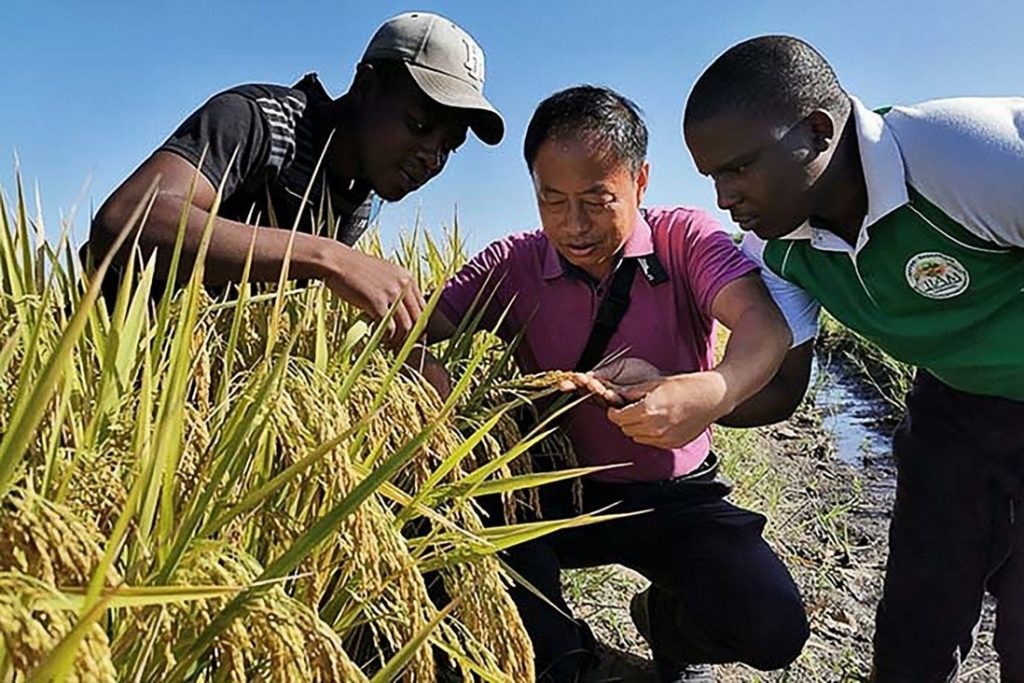
- Hundreds of specialists are working in Zambia, Ethiopia, Tanzania, Burkina Faso, Mozambique and elsewhere
- China has built 24 agricultural technology demonstration centres in the continent to help train farmers
Hundreds of Chinese agricultural experts are working with farmers and specialists across Africa to help them improve crop yields after Beijing promised to buy more of their produce.
Wu Peng, director general of the Africa affairs department at China’s foreign ministry, said that about a dozen agricultural experts had arrived in Burundi where they were welcomed by President Evariste Ndayishimiye.
“I hope China-Burundi agricultural cooperation can reach a new high through the efforts of the experts,” he said.
The experts arrived two months after Beijing completed the construction of an agricultural technology demonstration centre. The China International Development Cooperation Agency (CIDCA) said it hoped the centre would help to improve Burundi’s food security and people’s livelihoods.
China’s planting and breeding technologies would be distributed and implemented in Burundi through cooperation between the agricultural experts of the two countries, it said.
The agency said the centre would also promote the export of cereals to increase the country’s income and promote its development.
The new arrivals join hundreds of other Chinese agriculture experts already stationed across
, in Zambia, Ethiopia, Tanzania, Burkina Faso, Mozambique and elsewhere.
China has built 24 agricultural technology demonstration centres in the continent to help train farmers and improve yields for crops like maize and rice, benefiting more than 500,000 local people, according to Chinese officials.
Lina Benabdallah, an assistant professor of politics and international affairs at Wake Forest University in North Carolina, who has studied China’s role in Africa’s agriculture, said the goal of the centres was for Chinese agriculture experts to share their expertise with their African counterparts.
Much of China’s wealth could be attributed to food self-sufficiency and the agricultural advances it made in the 60s and 70s, she said.
“Agriculture holds a huge potential in Africa given the abundance of arable land … [and] is also a way to guarantee food security, an area that China has excelled in,” she said.
Although the lion’s share of the US$148 billion in loans that China advanced to African countries between 2000 and 2018 was spent on transport, power, mining, communication and water projects, about US$2 billion went to agriculture, according to the China Africa Research Initiative at the Johns Hopkins University School of Advanced International Studies.
In Bagre, a village in southeastern Burkina Faso, China has spent millions of dollars on irrigating farmlands to help improve crop yields.
According to CIDCA, Chinese experts have developed water and irrigation projects adapted to local conditions and trained more than 200 professionals. The water comes from a reservoir located more than 10km (six miles) away.
“This piece of land used to rely mainly on rainwater for its irrigation needs, but now it has a stable source of water to guarantee crops and rice yields,” said Chen Zongquan, one of the experts sent to Burkina Faso.
In Mozambique, CIDCA said that with the help of Mozambican and Chinese experts under the Sino-Mozambican agricultural cooperation project, the highest yield of Chinese hybrid rice in a 1,600 square-metre (17,000-square-foot) demonstration field was about 11 tonnes per hectare, and more than 10 tonnes per hectare for a local variety, more than six times the national average.
Zhou Yuyuan, a senior fellow at the Centre for West Asian and African Studies at the Shanghai Institutes for International Studies, said that besides the demonstration centres and experts, China also provided preferential tariffs for African agricultural products and encouraged firms to buy more African goods, like beef, coffee and flowers.
China’s imports from Africa are dominated by natural resources such as crude oil, copper, cobalt and diamonds. But several African countries have signed trade deals with China to boost their exports.
Tanzania exports soybeans, Kenya avocados, tea, coffee and roses, Ethiopia coffee and soybeans, Namibia beef, Botswana beef and by-products, South Africa fruit and Rwanda coffee.
Zhou said Chinese companies had increased their investments in agriculture and that the spending had extended beyond crop production to food processing, as well as other industries such as textiles and clothing.
“As African agriculture is developed and competitive, we may expect China will increase the imports from Africa to diversify its imports structure,” he said.
Yun Sun, director of the China programme at the Stimson Centre in Washington, said China’s agricultural support in Africa had been focused on the technology side, such as enhancing production. Some Chinese companies claimed success in promoting high-yield seeds, such as Yuanshi Seeds in Madagascar and
Nigeria, she said.
The goal had been to help Africa improve its food security, although in the past decade, how to turn these aid projects into commercially viable and sustainable projects had become a key question for the demonstration centres, she said.
The centres also faced challenges in becoming commercially viable, she said.
“Problems do exist, such as the related infrastructure needed, the struggle between the foreign aid budgetary support and the need for commercial success, the local adaptation,” she said.
“I think that the key lies in whether these demonstration centres or agricultural aid projects are essentially commercial or aid projects.”
South China Morning Post
 Africa -China Review Africa -China Cooperation and Transformation
Africa -China Review Africa -China Cooperation and Transformation
